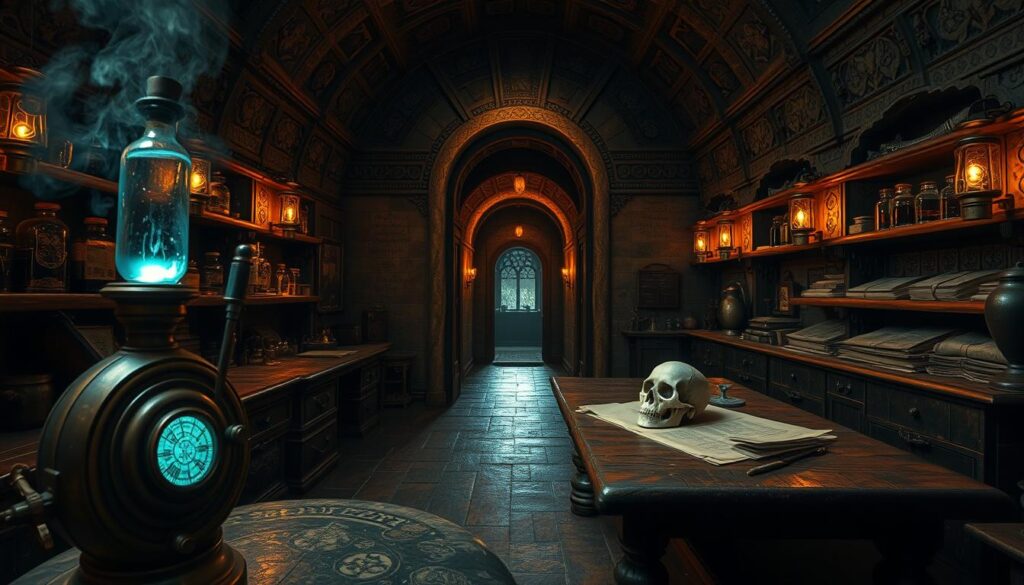Ancient medical practices have always fascinated us. They were often ahead of their time. Ancient civilizations made big contributions to medicine.
These practices have shaped medical history. Many discoveries from then are still useful today.
Learning about ancient medicine helps us understand modern medicine. It shows how far we’ve come. It also highlights the value of traditional remedies.

Ancient medicine has greatly influenced our understanding of health. Many of their discoveries are still important today. By looking at their achievements, we can improve our medicine.
Introduction to Ancient Medicines
Ancient medical practices have a long and diverse history. Many cultures have shaped medical knowledge. From ancient Egypt to China, each has contributed something unique.
By studying these practices, we learn about medical history. We see how knowledge has evolved over time.
Key Takeaways
- Ancient medical practices have made significant contributions to the development of modern medicine.
- Understanding ancient medical practices can provide valuable insights into the evolution of medical knowledge.
- Ancient civilizations have made many medical breakthroughs that are still relevant today.
- The study of ancient medical practices can shed light on the effectiveness of traditional remedies.
- Ancient medical practices have had a lasting impact on contemporary medical practices.
The Hidden Sophistication of Ancient Medical Practices
Ancient civilizations created remedies that were surprisingly effective, given their limited knowledge. These early practices helped ease symptoms and deepened our understanding of the human body. The discovery of ancient medical texts has shown us the complexity of these practices.
Some of the key areas where ancient medical practices excelled include:
- Understanding of the human body: Ancient civilizations had a remarkable grasp of human anatomy. They described the body’s systems and functions in detail.
- Development of surgical techniques: Ancient medical practitioners developed advanced surgical techniques. They used anesthesia and surgical instruments, which were ahead of their time.
- Use of traditional remedies: Ancient civilizations used herbal medicines and natural substances to treat ailments.
These ancient medical practices have greatly influenced modern medicine. Many traditional remedies are still used today. Studying ancient medical documents gives us insights into the development of modern medicine.
The impact of ancient civilizations on modern medicine is huge. From traditional remedies to advanced surgical techniques, their practices have shaped our understanding of health and disease. By studying these ancient practices, we appreciate the sophistication and complexity of ancient medical knowledge.
Ancient Chinese Medicine: More Than Just Traditional Remedies
Ancient Chinese medicine has been a key part of traditional healing for centuries. It offers many natural remedies and alternative medicine methods. At its heart, it aims to balance and harmonize the body, using natural ways to restore equilibrium.
Traditional Chinese medicine is built on key principles. It focuses on qi, or life energy, and balancing yin and yang forces in the body. Practitioners use methods like acupuncture, herbalism, and meditation to promote health and well-being.
Some benefits of traditional Chinese medicine include:
- Holistic approach to health, considering physical, emotional, and spiritual factors
- Use of natural remedies and alternative medicine techniques to minimize side effects
- Emphasis on prevention and wellness, rather than just treating symptoms
Traditional Chinese medicine has grown over time, blending old practices with new knowledge. Today, it works alongside Western medicine to offer a full health and wellness approach.
Egyptian Pharaohs’ Medical Knowledge: Beyond Basic Healthcare
The medical knowledge of the Egyptian pharaohs was more advanced than we thought. They focused on historical medical advancements and understood the human body well. This knowledge was recorded in texts like the Edwin Smith Papyrus, one of the oldest medical texts.
They made big contributions to medicine in several areas:
- Advanced understanding of the cardiovascular system
- Revolutionary pain management techniques
- Development of surgical procedures
Their traditional healing practices were based on natural world knowledge. They also valued mental and spiritual well-being in healing.
The Edwin Smith Papyrus shows the Egyptian pharaohs’ medical knowledge. It describes injuries and treatments, including surgery and herbal remedies. It shows a deep understanding of human anatomy and traditional healing.
The Edwin Smith Papyrus: A Window into Ancient Medical Knowledge
The Edwin Smith Papyrus is a key example of the Egyptian pharaohs’ medical knowledge. It gives us a look at their medical practices and shows their big contributions to medicine.
Advanced Understanding of the Cardiovascular System
The Egyptian pharaohs knew a lot about the cardiovascular system. They understood the heart’s role in blood circulation. This knowledge helped them develop treatments for diseases and injuries.
Revolutionary Pain Management Techniques
The Egyptian pharaohs also had new pain management techniques. They used herbal remedies and natural substances to reduce pain and aid healing. These traditional healing practices still influence modern medicine today.
Ancient Medicines More Advanced Than We Thought: New Archaeological Evidence
Recent discoveries in medical history have changed how we see ancient medicines. Archaeologists found proof of advanced medical practices in old civilizations. This shows that medicine’s history is more complex than we thought.
Some key findings include ancient surgical techniques like trephining. This method, where a hole is drilled in the skull, was used by the Egyptians and Greeks. Today, it’s still used in some ways. Also, archaeologists found ancient medicines like herbal remedies and natural substances for treating various illnesses.
These discoveries are important for understanding ancient medicines more advanced than we thought. They help us see how ancient practices shaped medical history. By studying these old practices, we learn more about medicine’s development and how cultures have helped us understand health and disease.
- The use of herbal remedies and other natural substances in ancient medicine
- The development of advanced surgical techniques, such as trephining
- The role of ancient cultures in shaping our understanding of medical history
Studying ancient medicines more advanced than we thought gives us a fascinating look at ancient cultures’ sophistication. By exploring these ancient practices, we appreciate medicine’s evolution and the contributions of different cultures to our health knowledge.
Greek and Roman Medical Innovations That Still Influence Modern Medicine
The ancient Greeks and Romans have greatly influenced medicine. Their ancient medical practices and traditional remedies still shape modern medicine. Many of their discoveries and methods are still used today.
In surgery, the Greeks and Romans made big strides. Hippocrates, known as the father of medicine, introduced many surgical techniques. He stressed the need for cleanliness and the right tools, setting the stage for today’s surgery.
The Romans also made big contributions, especially in public health. They created advanced systems for clean water and sanitation. They knew how important these were in stopping disease spread. Their traditional remedies often used natural things like herbs and minerals, still used in ancient medical practices today.
Some key innovations from Greek and Roman medicine include:
- Development of surgical instruments and techniques
- Emphasis on cleanliness and sanitation
- Use of natural ingredients in traditional remedies
These innovations have had a lasting impact on medicine. They shape how we approach healthcare today.
Ayurvedic Medicine: Ancient Wisdom Validated by Modern Science
Ayurvedic medicine is an ancient practice that modern science has validated. It offers natural remedies for many health issues. This alternative medicine aims to balance the body’s energy and improve overall health.
Key principles of Ayurvedic medicine include herbal remedies, dietary changes, and stress-reducing techniques. These natural remedies help manage anxiety, diabetes, and arthritis.

Ayurvedic medicine also benefits mental and emotional health. It includes meditation, yoga, and mindfulness practices. These can reduce stress and promote relaxation.
Some benefits of Ayurvedic medicine are:
- Improved overall health and well-being
- Reduced stress and anxiety
- Increased energy and vitality
- Enhanced mental clarity and focus
By using natural remedies and alternative medicine, we can improve our health and well-being. This holistic approach enhances our quality of life.
Ancient Antibiotics: Natural Remedies That Preceded Modern Medicine
Ancient people found natural ways to fight infections. They used historical medical advancements that helped start modern medicine. Honey was one of these ancient antibiotics, used to heal wounds and fight infections.
In ancient times, traditional healing was common. Honey was a key remedy because it was effective and easy to find. Other natural treatments, like moldy bread, were also used to fight infections. These early treatments led to the creation of modern antibiotics.
Honey as an Ancient Antibiotic
Honey’s special mix stops bacteria and other germs. This makes it great for healing wounds and infections.
Moldy Bread: The Predecessor to Penicillin
Moldy bread, which has penicillin, was used to cure infections long ago. Alexander Fleming’s discovery of penicillin changed how we treat bacterial infections. It helped create the antibiotics we use today.
Herbal Antimicrobials in Ancient Texts
Old texts, like the Ebers Papyrus, talk about using herbs to fight infections. These natural remedies, from plants and herbs, helped treat many diseases. Their powers were studied and turned into modern medicines.
Lost Medical Technologies of Ancient Civilizations
Ancient civilizations made big medical breakthroughs that were way ahead of their time. They had advanced surgical tools and diagnostic equipment. These were key to modern medicine’s growth. Egypt, China, and Greece, for example, showed great progress in medicine, despite limited resources.
Some lost medical technologies from ancient times include:
- Advanced surgical tools like forceps and scalpels for complex surgeries
- Diagnostic tools like pulse meters and urine analysis kits for disease diagnosis
- Early anesthetics like opium and mandrake for pain relief during surgery

These medical breakthroughs show the creativity and resourcefulness of ancient people. They are key to understanding medicine’s history. By studying these ancient discoveries, we can appreciate medicine’s evolution and ancient contributions. It also helps in developing new medical technologies and treatments.
Modern Validation of Ancient Medical Practices
Looking into medical history shows us that ancient medicines were more advanced than we thought. They used traditional remedies that are now part of today’s treatments. This shows how smart our ancestors were.
Studies have shown that many ancient medical practices work. This opens the door to a more complete healthcare approach. By studying ancient medicine, we learn how treatments have evolved.
Exploring ancient medicine’s history helps us understand medicine’s growth. We find new treatments and improve old ones. Ancient medicines are proving to be more advanced than we thought, with many used in modern medicine.
Some ancient medical practices that science has confirmed include:
- Herbal remedies for different health issues
- Acupuncture for pain and well-being
- Meditation and mindfulness for stress and mental health
Confirming ancient medical practices is a big step for medicine. It shows we value our ancestors’ work. As we keep exploring medical history, we might find even more advanced ancient medicines. This could lead to a better future for medicine.
Conclusion: Bridging Ancient Wisdom with Modern Medicine
Exploring ancient civilizations’ medical knowledge shows they were ahead of us in many ways. The ancient Egyptians had advanced surgery, and Ayurvedic medicine focused on wellness. These ancient wisdoms can improve our healthcare today.
By using traditional healing and alternative medicine, we can make healthcare better. Adding ancient practices like herbal remedies and holistic therapies gives patients more choices. This can lead to better health outcomes.
As medicine keeps getting better, we must remember our ancestors’ knowledge. Combining ancient and modern medicine creates a better healthcare system. It honors the past while using today’s advancements.
FAQ
What is the significance of ancient medical practices?
Ancient medical practices show us how old civilizations were ahead of their time. They used advanced surgery and knew a lot about the body. Their knowledge still shapes how we care for health today.
How did ancient Chinese medicine differ from traditional Western medicine?
Ancient Chinese medicine used natural remedies and focused on the whole person. Western medicine, on the other hand, used more invasive methods. But, Chinese medicine’s ideas are now part of today’s healthcare.
What medical advancements did ancient Egyptians make?
The Egyptians made big strides in medicine, like understanding the heart and pain relief. The Edwin Smith Papyrus shows their skill in treating injuries.
How have ancient Greek and Roman medical innovations influenced modern medicine?
The Greeks and Romans, especially Hippocrates and Galen, shaped modern medicine. Their ideas on diagnosis and surgery are still used today.
What are some examples of ancient antibiotics and natural remedies?
Old civilizations used natural items like honey and moldy bread for medicine. These were documented and are still studied for their health benefits.
How are ancient medical practices being integrated into contemporary healthcare?
Modern science is proving the value of ancient medicine. This has led to using traditional remedies in today’s treatments. It offers a more complete approach to health care.
